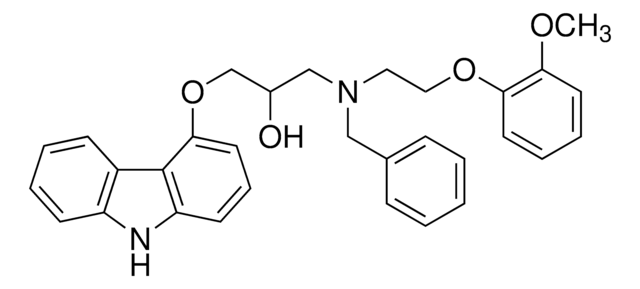Y0000155
Tramadol hydrochloride
European Pharmacopoeia (EP) Reference Standard
Synonyme(s) :
(±)-cis-2-(Dimethylaminomethyl)-1-(3-methoxyphenyl)cyclohexanol hydrochloride
About This Item
Produits recommandés
Qualité
pharmaceutical primary standard
Famille d'API
tramadol
Fabricant/nom de marque
EDQM
Contrôle du médicament
USDEA Schedule IV
Application(s)
pharmaceutical (small molecule)
Format
neat
Température de stockage
2-8°C
Chaîne SMILES
Cl.COc1cccc(c1)[C@@]2(O)CCCC[C@@H]2CN(C)C
InChI
1S/C16H25NO2.ClH/c1-17(2)12-14-7-4-5-10-16(14,18)13-8-6-9-15(11-13)19-3;/h6,8-9,11,14,18H,4-5,7,10,12H2,1-3H3;1H/t14-,16+;/m1./s1
Clé InChI
PPKXEPBICJTCRU-XMZRARIVSA-N
Vous recherchez des produits similaires ? Visite Guide de comparaison des produits
Description générale
Tramadol is a synthetic opiate agonist analgesic, widely used in patients suffering from moderate to severe chronic pain. It is considered safe when compared to other opioids. It contributes to the analgesic activity by blocking the nociceptive impulses at the spinal level, inhibiting the norepinephrine and serotonin reuptake.
Application
Actions biochimiques/physiologiques
Conditionnement
Autres remarques
Mention d'avertissement
Danger
Mentions de danger
Conseils de prudence
Classification des risques
Acute Tox. 3 Oral - Aquatic Chronic 2 - STOT SE 3
Organes cibles
Central nervous system
Code de la classe de stockage
6.1C - Combustible acute toxic Cat.3 / toxic compounds or compounds which causing chronic effects
Classe de danger pour l'eau (WGK)
WGK 2
Point d'éclair (°F)
Not applicable
Point d'éclair (°C)
Not applicable
Faites votre choix parmi les versions les plus récentes :
Certificats d'analyse (COA)
Désolés, nous n'avons pas de COA pour ce produit disponible en ligne pour le moment.
Si vous avez besoin d'assistance, veuillez contacter Service Clients
Déjà en possession de ce produit ?
Retrouvez la documentation relative aux produits que vous avez récemment achetés dans la Bibliothèque de documents.
Les clients ont également consulté
Notre équipe de scientifiques dispose d'une expérience dans tous les secteurs de la recherche, notamment en sciences de la vie, science des matériaux, synthèse chimique, chromatographie, analyse et dans de nombreux autres domaines..
Contacter notre Service technique








